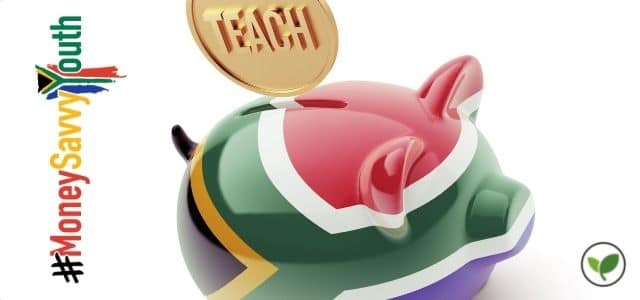“If there is one specific request or plea that I would have uttered when I was a youngster – it would have been: ‘Help raise and create in us a money-savvy youth, South Africa.’ The concept of money is a fundamental skill that any adult, parent, guardian, family member or teacher can help teach and offer our young ones. It does not only offer a victorious situation for the youth and their future financial decision-making, but it is also a win for South Africa’s economy and prosperity,”
highlights Carla Oberholzer (debt advisor at DebtSafe).
Oberholzer encourages adults to help raise a generation of money-savvy young people, and the key is to ‘catch them young’. By starting early, adults can help the youth acquire the knowledge, practical skills, and confidence to make informed financial future decisions. Now is a good time as any to start with the empowerment process – grown-ups need to start talking to kids about money, make the money concept tangible and help the youth to become financially literate.
DebtSafe’s team has compiled an age-by-age guide that offers grown-ups (including younger adults) ideas on what to include in their financial youth-based teachings:
TODDLERS (2-3 Years) –
Creative, educational learning & ‘make pretend’…
Parents/Guardians/Teachers can incorporate money-savvy, creative learning & ‘make pretend’ fun, straightforward ways to introduce the concept of money/finance to TODDLERS (2 to 3-year-olds). Here are a few suggestions for them to consider:
- Toddlers can begin to learn to differentiate the names of coins (cents) and notes (Rand) – Adults can play a ‘colour game’ and let the children get familiar with money. **Note: This type of game requires supervision when playing with fake/real money, especially with that R1, R2, R5 or 10c, 20c and 50c coins.
- Toddlers can begin to understand the basics of ‘business’ by exchanging money/play money for goods. ‘Shopping at home’ is fun and educational.
PRESCHOOLERS (3-5 Years) –
Imaginary play & chore-related (allowance/pocket money) activities…
Adults are encouraged to allow PRESCHOOLERS (3 to 5-year-olds) to take part in money-savvy educational teachings & activities:
- Imaginary play initiatives like ‘restaurant’ or ‘grocery shop’ can incorporate skills such as learning good manners & making change as the cashier.
- Doing chores for pocket money offers educational moments. And, don’t forget the tangible, ‘feel’ concept of what saving via a piggy bank can teach a preschooler.
By incorporating the above examples, preschoolers can start grasping the ‘money concept’ & attain a basic understanding that there are ‘bills’ to pay.
GRADESCHOOLERS (6-12 Years) –
Comparison teachings & introducing ‘money tools’…
There are various things that parents/guardians can do to up GRADESCHOOLERS’ (6 to 12-year-olds) money awareness and skills, for example:
- Open a children’s bank account: Various South African banks offer these accounts and include a FREE (R0.00) service fee PLUS specially designed rewards for children.
- Comparison shopping: Kids can have educational shopping outings to spot discounts and compare generic versus brand-name products’ prices.
TEENAGERS (12-18 Years) –
The value of budgeting & the gift of giving…
Believe it or not, parents can teach TEENAGERS (12 to 18-year-olds) a few ‘financial ropes’ to help them become money-savvy stewards. Here are a few considerations:
- Pocket money/allowance can quickly disappear for teens between lunch money, school supplies, and other small requirements. Parents are encouraged to help their children set up a budget and explain the difference between ‘a want’ and ‘a need’.
- There are also various bank/phone apps for children that parents/guardians can incorporate into the learning discussions/activities. They can also make use of available programmes, such as ‘MoneyTime’ or ‘StarSaver’, that can assist them in teaching various financial skills.
- There is nothing better to explain the concept of money than by also giving to charity (adults can let their children choose organisations they would like to contribute to). “A financial lesson via a corporate responsibility initiative offers teachable moments and is a long-term ‘money behaviour’ investment for any teenager,” highlights Oberholzer.
YOUNG ADULTS (18-30 years) –
Various disciplines can set a Young Adult up for a financial freedom win…
DebtSafe wants to encourage South African young adults to continue with money-savvy ways whether they have been taught money principles from a young age or not. Here are a few things for them to consider:
- Budgeting is a must. They can use various tools to fit their personality.
- They need to distinguish between actual ‘needs’ versus ‘wants clearly’.
- Why the pressure? Young, working adults can start small when taking out credit/debt – there is no need to buy a lavish house and a car all in one go.
- Wealth, emergency planning & health investments are crucial – professionals can assist with medical and financial products (like an emergency fund or retirement plan).
- Young individuals should keep a regular eye on their debt and have a worked-out plan to incorporate short-term or long-term goals and savings into their budget.
Money plays an essential role in each individual’s life. And it, therefore, also deserves a substantial amount of attention starting from a young and youthful age. Learning how to save, budget and take accountability for their debt are masteries that the youth should incorporate and learn early in life. Money teachings will set young people up to experience the gift of financial freedom. DebtSafe commemorates adults such as parents, guardians and teachers with this unavoidable, imperative task.
